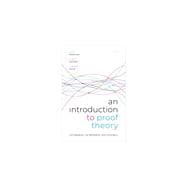
An Introduction to Proof Theory Normalization, Cut-Elimination, and Consistency Proofs
by Mancosu, Paolo; Galvan, Sergio; Zach, RichardBuy New
Rent Textbook
Rent Digital
Used Textbook
We're Sorry
Sold Out
How Marketplace Works:
- This item is offered by an independent seller and not shipped from our warehouse
- Item details like edition and cover design may differ from our description; see seller's comments before ordering.
- Sellers much confirm and ship within two business days; otherwise, the order will be cancelled and refunded.
- Marketplace purchases cannot be returned to eCampus.com. Contact the seller directly for inquiries; if no response within two days, contact customer service.
- Additional shipping costs apply to Marketplace purchases. Review shipping costs at checkout.
Summary
half covers topics in structural proof theory, including the G?del-Gentzen translation of classical into intuitionistic logic (and arithmetic), natural deduction and the normalization theorems (for both NJ and NK), the sequent calculus, including cut-elimination and mid-sequent theorems, and various
applications of these results. The second half examines ordinal proof theory, specifically Gentzen's consistency proof for first-order Peano Arithmetic. The theory of ordinal notations and other elements of ordinal theory are developed from scratch, and no knowledge of set theory is presumed. The
proof methods needed to establish proof-theoretic results, especially proof by induction, are introduced in stages throughout the text. Mancosu, Galvan, and Zach's introduction will provide a solid foundation for those looking to understand this central area of mathematical logic and the philosophy
of mathematics.
Author Biography
Paolo Mancosu, UC Berkeley,Sergio Galvan, Catholic University of Milan,Richard Zach, University of Calgary
Paolo Mancosu is Willis S. and Marion Slusser Professor of Philosophy at the University of California at Berkeley. He is the author of numerous articles and books in logic and philosophy of mathematics. During his career he has taught at Stanford, Oxford, and Yale. He was awarded a fellowship at the
Wissenschaftskolleg zu Berlin in 1997-1998, a stipendiary position as Directeur de recherche invit?; au CNRS in Paris in 2004-2005, a Guggenheim Fellowship in 2008-2009, a position as member at the Institute of Advanced Study in Princeton in 2009, a visiting professorship as LMU-UCB Research in the
Humanities at LMU in 2014, and a Humboldt Research Award in 2017-2018.
Sergio Galvan is emeritus Professor of Logic at the Catholic University of Milan, Italy. His main areas of research are proof-theory and philosophical logic. In the first area he focuses on sequent calculi and natural deduction, the metamathematics of arithmetic systems (from Q to PA), G?del's
incompleteness theorems, and Gentzen's cut-elimination theorem. In the second area, his major interest is in the philosophical interpretations (deontic, epistemic and metaphysical) of modal logic. Recently, he has been working on the relationships between formal proof and intuition in mathematics,
and on the metaphysics of essence and the ontology of possibilia.
Richard Zach is Professor of Philosophy at the University of Calgary, Canada. He works in logic, history of analytic philosophy, and the philosophy of mathematics. In logic, his main interests are non-classical logics and proof theory. He has also written on the development of formal logic and
historical figures associated with this development such as Hilbert, G?del, and Carnap. He has held visiting appointments at the University of California, Irvine, McGill University, and the University of Technology, Vienna.
An electronic version of this book is available through VitalSource.
This book is viewable on PC, Mac, iPhone, iPad, iPod Touch, and most smartphones.
By purchasing, you will be able to view this book online, as well as download it, for the chosen number of days.
Digital License
You are licensing a digital product for a set duration. Durations are set forth in the product description, with "Lifetime" typically meaning five (5) years of online access and permanent download to a supported device. All licenses are non-transferable.
More details can be found here.
A downloadable version of this book is available through the eCampus Reader or compatible Adobe readers.
Applications are available on iOS, Android, PC, Mac, and Windows Mobile platforms.
Please view the compatibility matrix prior to purchase.
